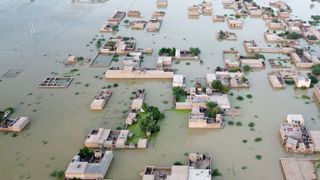Climate change could upend fight against malaria, WHO warns
Malaria cases rose in 2022, in part due to climate change-related extreme weather events.

Climate change — and the extreme weather events it brings — could raise global malaria rates, the World Health Organization (WHO) warned Thursday (Nov. 30).
"The changing climate poses a substantial risk to progress against malaria, particularly in vulnerable regions," WHO Director-General Tedros Adhanom Ghebreyesus said in a statement. "Sustainable and resilient malaria responses are needed now more than ever, coupled with urgent actions to slow the pace of global warming and reduce its effects."
In its latest World Malaria Report, the WHO estimated that there were 249 million cases of the mosquito-spread disease in 2022, up from about 244 million in 2021 and a similar number in 2020. That was 16 million more cases than seen in 2019, when malaria cases hit a trough just before the COVID-19 pandemic disrupted malaria prevention efforts worldwide.
Most of the five million additional malaria cases between 2021 and 2022 happened in five countries — Pakistan, Nigeria, Uganda, Ethiopia and Papua-New Guinea. Pakistan saw the largest increase at 2.6 million cases, compared to 500,000 in 2021. The uptick was tied to the destructive flooding that plunged much of Pakistan underwater, providing new breeding ground to mosquitoes.
Related: 5 malaria cases in Florida and Texas were acquired locally, CDC warns
"With the very heavy monsoons we expected these consequences, but not up to this magnitude," Dr. Muhammad Mukhtar, director of Pakistan's national malaria control program, told The New York Times. The standing water left from the monsoons, coupled with displaced people having nowhere to hang mosquito nets, triggered the uptick in malaria, he said.
"The places that are most affected are the places that have the least infrastructure to respond to these sorts of events," Ross Boyce, an assistant professor of medicine and epidemiology at the University of North Carolina School of Medicine, told The Washington Post. "I do think it’s going to become an increasing contributor to global malaria burden."
In addition to the direct effects of climate change, such as extreme flooding in places where malaria is endemic, indirect effects may also drive up malaria cases, the WHO noted. For instance, climate-related disasters could reduce people's access to essential malaria services and cause disruptions in the supply chain of insecticide-treated nets, antimalarial medicines and vaccines.
Despite the recent surge in infection, malaria deaths fell to 608,000 in 2022 from a recent high of 631,000 in 2020, although this rate still outpaces prepandemic levels, the WHO reported. (Prior to the pandemic, in 2019, the death rate had been driven down to 576,000.)
And in other positive news, the first malaria vaccine recommended by the WHO, called RTS,S/AS01, was successfully rolled out in three African countries over the past few years, and a second vaccine was recommended for use earlier this year. The countries with RTS,S/AS01 — Ghana, Kenya and Malawi — have seen a 13% decline in early childhood deaths, the WHO reported.
Ever wonder why some people build muscle more easily than others or why freckles come out in the sun? Send us your questions about how the human body works to community@livescience.com with the subject line "Health Desk Q," and you may see your question answered on the website!
Live Science newsletter
Stay up to date on the latest science news by signing up for our Essentials newsletter.

Nicoletta Lanese is the health channel editor at Live Science and was previously a news editor and staff writer at the site. She holds a graduate certificate in science communication from UC Santa Cruz and degrees in neuroscience and dance from the University of Florida. Her work has appeared in The Scientist, Science News, the Mercury News, Mongabay and Stanford Medicine Magazine, among other outlets. Based in NYC, she also remains heavily involved in dance and performs in local choreographers' work.
-
Redskyroad Malaria, covid, you name it. It's the planet's way of fighting back. Humans need to start dying at a rapid pace if we are to surviveReply
Most Popular

By Harry Baker
